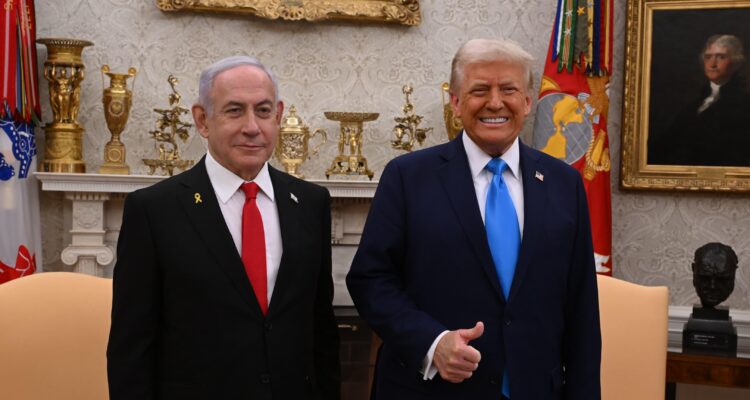Trump has described the tariff rates as “reciprocal” despite Jerusalem’s free trade agreement with the United States.
By Akiva Van Koningsveld, JNS
Israel is actively negotiating with the United States regarding the tariffs imposed on it by Washington, White House trade adviser Peter Navarro told NBC‘s “Meet the Press” on Sunday.
“We’ve got the U.K., we’ve got the E.U., we’ve got India, we’ve got Japan, we’ve got North Korea, we’ve got Indonesia, we’ve got Israel, and they’re just lining up outside the door of Jamieson Greer, the trade rep, and [Secretary of Commerce] Howard Lutnick, [who] is very much a part of that,” Navarro said.
U.S. President Donald Trump announced on April 9 that he was pausing his planned tariff hikes, beyond the baseline 10%, on more than 75 countries, including Israel, after they had reached out to negotiate solutions to eliminate trade barriers.
Prime Minister Benjamin Netanyahu flew to Washington last week to argue that Jerusalem, which lifted all tariffs on the United States, should not face the 17% tariff rate that the U.S. president announced on April 2.
“We will eliminate the trade deficit with the United States,” Netanyahu declared in the Oval Office on April 7.
“We intend to do it very quickly. We think it’s the right thing to do. And we’re going to also eliminate trade barriers, a variety of trade barriers put up unnecessarily.”
Trump has described the tariff rates as “reciprocal” despite Jerusalem’s free trade agreement with the United States and even though the Jewish state and some other countries have no tariffs on U.S. imports.
An equation published by the U.S. Trade Representative’s office revealed that the rates were calculated based on each country’s trade deficit in goods, but not services, with the United States.
As many as 26,000 Israelis stand to lose their jobs if the tariffs remain in place, the Manufacturers Association of Israel said ahead of the meeting between Netanyahu and Trump.
According to the association, exports will take an annual $2.3 billion hit from the tariffs if fully implemented, and between 18,000 and 26,000 Israelis could lose their jobs.
A rise to 17% would be expected to impact “the competitiveness of the entire economy, on the ability to attract investments, on our technological superiority and more,” Ron Tomer, the head of the Manufacturers Association, warned in a letter to the prime minister on April 6.
Israeli Finance Minister Bezalel Smotrich’s office said on Thursday that his staff was preparing “a range of potential measures that could be advanced, in cooperation with the U.S. administration, in order to maximize the benefits for both countries’ economies.
“The Ministry of Finance is maintaining ongoing dialogue with the business sector, industrialists and exporters, and is working with the U.S. administration to reduce the scope of the tariffs and minimize their impact on Israeli industry,” the ministry’s statement continued.
At Netanyahu’s request, an Israeli delegation led by Smotrich is to depart for Washington after Passover to conduct additional “intensive talks” with U.S. officials.





